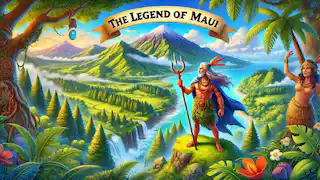Chapter 1: The Birth of Maui
In the ancient times of New Zealand, before the land was touched by the modern world, a boy named Maui was born. He was the youngest of his siblings, and his birth was shrouded in mystery. His mother, Taranga, was a woman of great beauty and wisdom, and his father, Makeatutara, was a guardian of the underworld.
Maui's birth was extraordinary. As a newborn, he was cast into the sea by his mother, who believed he was stillborn. However, the ocean cradled him gently and carried him to the shore, where he was found by the sea gods. They wrapped him in seaweed and nurtured him until he grew strong. When he was old enough, the sea gods returned him to his mother, who was astonished to see her son alive and well.
Maui's return to his family was not without challenges. His brothers were jealous of the attention he received and often excluded him from their games and adventures. Yet, Maui was resourceful and determined. He observed and learned from the world around him, acquiring knowledge and skills that surpassed his brothers.
One day, as Maui played near the shore, he discovered a hidden cave. Inside, he found ancient carvings and relics left by his ancestors. These artifacts spoke of great deeds and magical powers, filling Maui with a sense of destiny. He realized that he was meant for greatness, a belief that drove him to achieve remarkable feats.
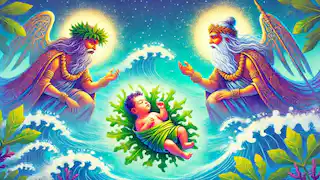
Chapter 2: Maui’s Magical Fish Hook
One day, Maui decided to prove his worth to his brothers. He crafted a magical fish hook from the jawbone of his ancestor, Muri-ranga-whenua. This fish hook was no ordinary tool; it possessed the power to catch anything, even the greatest treasures of the ocean.
Maui approached his brothers and suggested a fishing trip. Skeptical but curious, they agreed. As they sailed far into the ocean, Maui chanted ancient incantations, calling upon the power of his fish hook. He cast the hook into the sea, and immediately, it caught onto something immense.
With great effort, Maui began to pull. The sea churned and roared as Maui hauled up the enormous catch. To the amazement of his brothers, Maui did not catch a fish but the entire North Island of New Zealand. The island rose from the depths, revealing mountains, forests, and rivers. This feat earned Maui the respect of his brothers and cemented his place in Maori legend.
The creation of the North Island brought immense joy to the people. They marveled at the new land, which was rich in resources and beauty. The elders praised Maui, declaring that his fish hook had unlocked the hidden potential of the ocean. Maui's brothers, once envious, now looked up to him with admiration.
Chapter 3: The Slowing of the Sun
Despite his accomplishments, Maui felt that his work was not yet complete. He noticed that the days were too short for his people to accomplish their tasks. Determined to help, Maui devised a plan to slow the sun's journey across the sky.
He sought the assistance of his brothers once more, and together they journeyed to the edge of the world, where the sun rested at night. Using flax ropes, they crafted a giant snare and waited for the sun to rise. As the first rays of dawn appeared, Maui and his brothers sprang into action, capturing the sun in their trap.
The sun struggled fiercely, but Maui’s strength and determination prevailed. He struck the sun with his enchanted fish hook, forcing it to move more slowly across the sky. This extended the length of the days, allowing the people more time to work and play. The gratitude of his people echoed through the ages, and Maui's legend grew even greater.
The slowing of the sun had profound effects on the daily lives of the people. Farmers were able to tend to their crops longer, ensuring bountiful harvests. Children played until dusk, their laughter filling the air. The community thrived, and they celebrated Maui's ingenuity with festivals and songs.
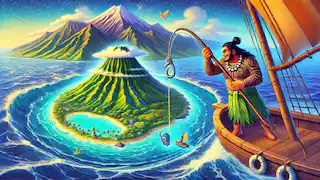
Chapter 4: The Secret of Fire
Maui’s curiosity and desire to help his people knew no bounds. He noticed that his people struggled to create fire, often enduring cold nights and raw food. Maui decided to visit Mahuika, the goddess of fire, to learn the secret of fire.
Maui traveled to the underworld, where Mahuika dwelled. He approached the goddess with respect and asked for her aid. Impressed by his courage and determination, Mahuika plucked one of her fiery fingernails and gave it to Maui. This nail, she explained, contained the essence of fire.
Maui returned to his village and demonstrated the power of Mahuika’s gift. However, his mischievous nature got the better of him, and he decided to test Mahuika's patience. He extinguished the fire repeatedly, each time asking for another fingernail. Mahuika grew angry and, realizing Maui’s trickery, unleashed her fury upon him.
In a desperate attempt to escape, Maui transformed into various animals, but Mahuika's flames pursued him relentlessly. Finally, he transformed into a hawk and flew to the sky. Mahuika's flames scorched the earth, creating the first volcanoes. Despite the chaos, Maui managed to save a few sparks of fire, which he gave to his people, ensuring they would never be without fire again.
The people celebrated this gift, recognizing the warmth and light that fire brought into their lives. They gathered around bonfires, telling stories and cooking feasts. Maui’s cleverness and bravery were praised, and he became a beloved figure in their hearts.
Chapter 5: Maui’s Visit to the Underworld
Maui’s adventures took him to many strange and dangerous places. One such journey was his visit to the underworld, where he sought to learn about life and death. The underworld was a realm of shadows and spirits, ruled by the goddess Hine-nui-te-pō.
To enter the underworld, Maui had to pass through a series of trials. He navigated dark forests, crossed treacherous rivers, and faced fearsome creatures. Each challenge tested his wit and courage, but Maui was undeterred. He relied on his knowledge and resourcefulness, overcoming every obstacle in his path.
When he finally reached the entrance to the underworld, Maui was greeted by Hine-nui-te-pō herself. The goddess was a formidable figure, with eyes that gleamed like stars and hair that flowed like rivers. She regarded Maui with curiosity, impressed by his determination.
Maui asked the goddess to reveal the secrets of life and death. Hine-nui-te-pō agreed, but warned him that such knowledge came with great responsibility. She showed Maui visions of the afterlife, where the spirits of the departed dwelled in peace. She explained that death was a natural part of the cycle of life, and that immortality was not meant for mortals.
Maui left the underworld with a deeper understanding of the world and his place in it. He realized that his quest for immortality was misguided, and that true greatness lay in living a life of courage and wisdom.
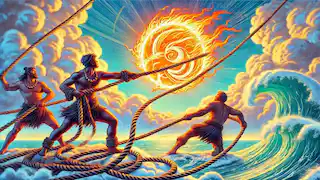
Chapter 6: The Quest for Immortality
Despite his newfound wisdom, Maui’s final and most ambitious quest was to conquer death itself. He learned of Hine-nui-te-pō, the goddess of death, who resided in the underworld. Maui believed that if he could defeat her, he could grant immortality to humanity.
He journeyed to the underworld and found Hine-nui-te-pō sleeping. Maui’s plan was to enter her body through her mouth and exit through her navel, reversing the cycle of life and death. However, he was warned that if he made any noise, he would awaken the goddess and fail.
Maui began his attempt, but as he was halfway through, a small bird laughed at the sight. The sound woke Hine-nui-te-pō, who crushed Maui between her thighs, ending his quest and his life. Despite his failure, Maui's bravery and determination left an indelible mark on the world.
Chapter 7: Maui’s Journey Across the Islands
After his death, Maui’s spirit continued to wander the lands of New Zealand. His adventures took him to many places, each with its own stories and legends. As a spirit, Maui was free to explore the hidden corners of the world, uncovering secrets and helping those in need.
In one of his journeys, Maui visited the South Island, known as Te Waka-a-Maui (the canoe of Maui). He discovered a land of towering mountains and pristine lakes, inhabited by tribes who lived in harmony with nature. Maui taught them the skills he had learned in life, from fishing and hunting to the creation of fire.
The people of the South Island revered Maui as a guardian spirit. They built shrines in his honor and sang songs of his deeds. Maui’s presence brought them good fortune, and his stories became an integral part of their culture.
Maui also traveled to the smaller islands surrounding New Zealand. On these islands, he found communities with unique customs and traditions. He shared his knowledge and wisdom with them, fostering a sense of unity and connection among the scattered tribes.
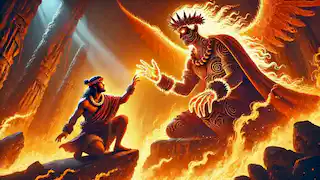
Chapter 8: Maui and the Spirits of Nature
As a spirit, Maui developed a deep connection with the natural world. He could communicate with the spirits of the forests, rivers, and mountains, who guided him on his journeys. These spirits were ancient beings, guardians of the earth’s secrets.
One such spirit was Tane, the god of the forests. T
ane taught Maui the language of the trees and the songs of the birds. Through Tane, Maui learned to respect and protect the natural world, understanding the delicate balance that sustained life.
Maui also met Tangaroa, the god of the sea. Tangaroa revealed the mysteries of the ocean, teaching Maui about the currents, tides, and marine life. Maui’s bond with Tangaroa deepened his appreciation for the sea, which had cradled him as a baby and supported him throughout his life.
The spirits of nature recognized Maui’s courage and wisdom, granting him their blessings. They helped him in his quests, guiding him through dangerous territories and protecting him from harm. Maui, in turn, honored the spirits through rituals and offerings, strengthening the bond between humans and nature.
Chapter 9: The Lessons of Maui
Maui’s adventures were not just tales of heroism, but also lessons for his people. Each story carried a message, teaching values such as bravery, resourcefulness, and respect for nature. These lessons were passed down through generations, shaping the culture and identity of the Maori people.
One of the most important lessons was the value of curiosity and innovation. Maui’s inquisitive nature led him to discover new lands, create new tools, and solve problems in creative ways. He encouraged his people to be curious and to seek knowledge, believing that progress came from questioning the world around them.
Another lesson was the importance of community and cooperation. Maui often relied on the help of his brothers and the spirits of nature to achieve his goals. He taught his people that working together and supporting each other was the key to overcoming challenges and achieving greatness.
Maui also emphasized the need for respect and humility. Despite his many accomplishments, Maui acknowledged the limits of his power and the wisdom of the gods. He understood that true strength came from recognizing one’s place in the world and respecting the forces that governed it.
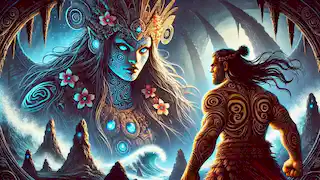
Chapter 10: The Legacy of Maui
Maui’s deeds and adventures became the foundation of many Maori myths and legends. His stories were passed down through generations, teaching lessons of bravery, resourcefulness, and the importance of helping others.
The islands of New Zealand, known as Aotearoa, bear the marks of Maui’s incredible feats. The North Island, known as Te Ika-a-Maui (the fish of Maui), and the South Island, known as Te Waka-a-Maui (the canoe of Maui), are eternal reminders of his legacy.
Even today, the people of New Zealand celebrate Maui through stories, songs, and dances. His legend is a testament to the enduring power of myth and the human spirit’s quest for greatness.
Maui’s influence extends beyond New Zealand. His tales are shared among Polynesian cultures, each adding their own unique elements to his legend. From Hawaii to Tahiti, Maui is celebrated as a hero and a symbol of ingenuity and resilience.
Epilogue: The Spirit of Maui
In the quiet moments of dawn, when the first light touches the land, the spirit of Maui can still be felt. His influence lives on in the natural world, in the mountains, rivers, and forests he helped create. The lessons he taught continue to inspire courage and innovation among the Maori and all who hear his tale.
Maui’s legend is not just a story of a hero but a reflection of the values and beliefs of the Maori people. It reminds us that even the smallest among us can achieve greatness through determination, intelligence, and a willingness to challenge the status quo.
The spirit of Maui endures in the hearts of the people, a guiding light in times of darkness and a beacon of hope for future generations. His story is a reminder that the legacy of a hero is not measured by their victories alone, but by the wisdom and inspiration they leave behind.
